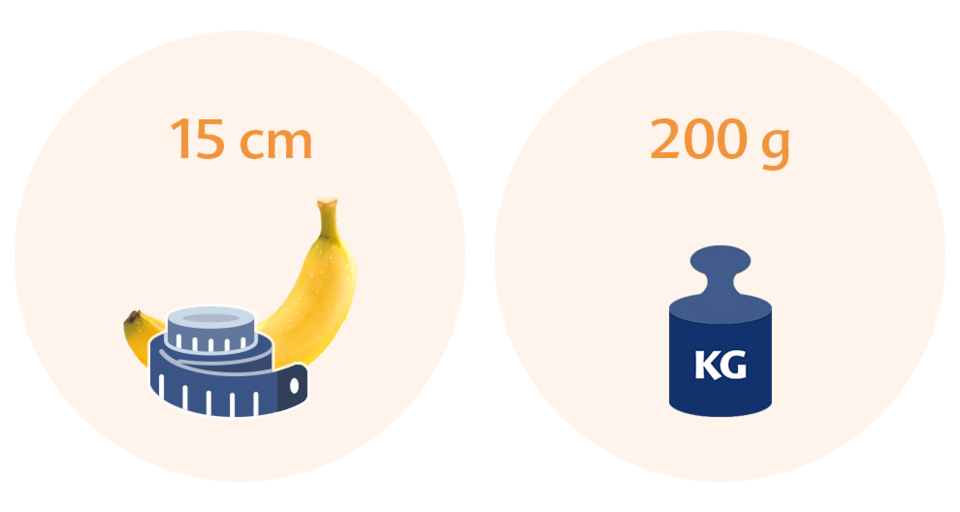Your baby’s development
Your baby’s sensory organs are now developed to the extent that they show clear reactions when it’s quiet and when it’s noisy. This is the start of their adaptation to life outside the womb and to your personal rhythm.
The small human inside you already needs affection: for instance, they react to the warmth of your hands when you put them on your belly, an initial and intensive form of communication between you. It needn’t just be your hands either – their dad, their siblings or a close friend can also “talk” to them in this manner.
In week 19, your baby can also hear voices clearly and recognise them. Mummy’s voice and smell will have a calming effect on them after they’re born, letting them know that they’re in a safe, loving environment.
Your baby’s brain develops very quickly in week 19, particularly the areas responsible for sensory perception (taste, smell, hearing, sight and touch).
They also continue suck their thumb frequently as they train their sucking reflex. This ability will help keep them calm and relaxed once they’re outside the womb, as the sucking motion both gets them the food they need and builds up their trust.
Their grasping reflex, which they practise by moving their fingers and forming a fist, is also hugely important. They can pinch their nose and reach for the umbilical cord and pull on it.
Your baby’s skin is becoming more dense, which means it’s not as translucent as before.
Are you expecting a boy? Although their scrotum will be clearly visible in week 19, their testicles will remain in their abdomen before moving down into the scrotum shortly before birth. Male foetuses begin producing testosterone in week 16, a hormone that plays a key role in developing their testicles.
Are you expecting a girl? By week 19, several million eggs have already formed in her ovaries, and they will continue to mature when she develops from being a girl to becoming a woman during puberty. From then on, an egg will leave the ovary every month in order to be fertilised. This means the eggs that can be fertilised later in life are formed well before your little girl is even born.
What it’s like for the mum-to-be in week 19
Your bump is getting bigger, and you’re getting heavier. At the moment, however, your baby’s increasing weight is only a small part of that – your growing uterus, the placenta, your fat reserves and the amniotic fluid are the main causes for the extra weight.
You’re probably wondering how you’ll cope with the weight you’ll put on over the next few months until you give birth. Don’t worry: the pregnancy hormones are making your joints softer and your tendons more flexible, so your body will be able to handle the weight you gain.
Use our individual pregnancy weight calculator to check if your weight gain is within the recommended range.
Common signs and symptoms
As at every stage of your pregnancy, there will be signs or symptoms in week 19 that you haven’t previously experienced. Of course every woman is different, so don’t worry if any of these don’t seem to apply to you.
Ravenous appetite
You may suddenly feel ravenously hungry due to the hormones affecting your body, including at night. This is your body’s way of getting the nutrients it urgently needs to support your baby as they grow.
Eat when you want to, but remember that smaller quantities are better and try to avoid unhealthy food.
Needing to pee
You’ll definitely have noticed that you need to go to the toilet more often. Always go when you need to, as it helps rid your bladder of pathogens which could otherwise cause problems there.
Heavy, painful legs and swollen feet
Even if you haven’t been walking very far or haven’t been standing for a long time, your legs can feel heavy and slightly painful. This is because of insufficient return flow in your blood and lymphatic system, which is sometimes inevitable given the huge amount of work your heart and blood vessels have to do during pregnancy. Return flow can be particularly bad in summer – many pregnant women suffer heavy legs in hot temperatures.
So take every opportunity you get to sit or lie down with your legs in a raised position. This will ensure enough blood circulates through your veins and your lymphatic system works as it should, which will help your swollen feet get back to normal more quickly. A foot massage with massage oil is another good way to speed up this process (plus it will help reduce your stress levels and you’ll sleep better). A cold foot bath will also do you good in the summer.
Midwife’s advice
‘In the evening, rub your legs with a soothing cream or gel and then sit with your legs raised. It’s a good idea to wear compression tights during the day, even if you don’t have varicose veins. Your gynaecologist can prescribe them for you.’ Dorothee Kutz, midwife
Metabolism at full throttle
During pregnancy, your metabolism will be working flat out and your electrolyte balance can easily be affected: retaining water in the extra tissue (the result of your hormones) and exchanging amniotic fluid asks a lot of your body. Some of the amniotic fluid is absorbed and converted by the foetus, and the end product is returned to your bloodstream. The blood containing parts of the amniotic fluid is then cleaned by your liver, and the exchange cycle continues. The volume of amniotic fluid increases as your baby grows throughout your pregnancy.
You can ensure you get the fluids you need and help your organs do their job by regularly drinking liquids such as mineral water and low-acid juices.
You can also try our organic herbal tea for pregnant women.The herbs from the tea blend are a natural way to help your body handle the additional challenges of pregnancy.
Questions you may want to ask your doctor or midwife
Training your muscles and tendons
Belly bands can be extremely helpful, as they are made partly from elastane so they fit snugly around your bump and provide good support for your belly and your back. Ask your midwife about which exercises are the most effective for week 19. Remember to keep training your pelvic floor muscles too.
How you can help your veins
If you already have varicose veins or have a genetic predisposition for them or if heart disease runs in your family, ask your doctor if it would be a good idea to wear compression tights during your pregnancy.
These tights are highly elastic and will help maintain blood flow, making them an effective way to prevent varicose veins. You must wear them if you travel by plane!
Information about the author:
Juliane Jacke-Gerlitz is a registered nurse. She has been working in the field of mother and breastfeeding counselling for more than ten years. Currently she is working as a medical writer and psychological consultant. Juliane Jacke-Gerlitz has been married for 22 years, is a mother of eight children and lives with her family in Halle.






